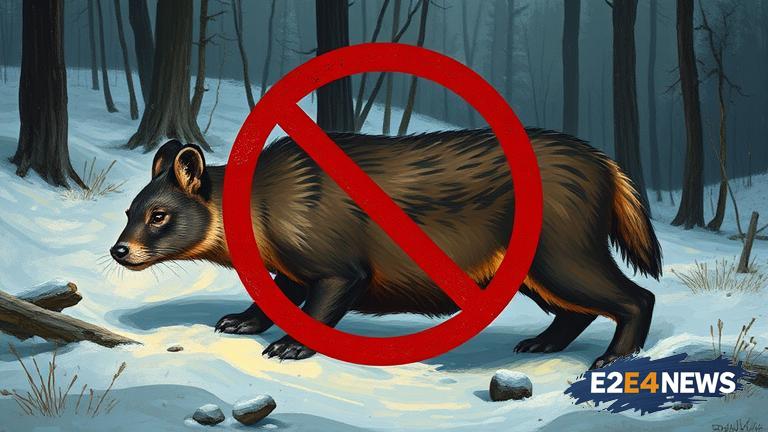The state of Vermont is considering a bill that would prohibit the use of bait in hunting furbearer species, such as coyotes, foxes, and raccoons. The bill, H-132, has been introduced to the Vermont House of Representatives and is currently under review. If passed, the bill would make it illegal to use bait, such as food or other attractants, to lure and hunt furbearer species. Proponents of the bill argue that the use of bait is inhumane and can lead to the overhunting of certain species. They also argue that baiting can disrupt the natural balance of the ecosystem and lead to the spread of disease among wildlife. On the other hand, opponents of the bill argue that baiting is a necessary tool for hunters and trappers, and that it is a long-standing tradition in Vermont. They also argue that the bill would be difficult to enforce and could lead to unintended consequences, such as the increased use of other hunting methods that are more harmful to the environment. The bill has sparked a heated debate among hunters, trappers, and animal welfare advocates, with some arguing that it is a necessary step to protect wildlife and others arguing that it is an overreach of government authority. The use of bait in hunting is a common practice in many parts of the country, but it is also a practice that is widely criticized by animal welfare advocates. Many argue that baiting is a cruel and inhumane practice that can cause unnecessary suffering to animals. Others argue that it is a necessary tool for hunters and trappers, and that it is a long-standing tradition in many parts of the country. The bill is currently being reviewed by the Vermont House of Representatives, and it is unclear whether it will pass or not. If it does pass, it would make Vermont one of the first states in the country to prohibit the use of bait in hunting furbearer species. The bill has been praised by animal welfare advocates, who argue that it is a necessary step to protect wildlife and promote more humane hunting practices. However, it has also been criticized by hunters and trappers, who argue that it would be difficult to enforce and could lead to unintended consequences. The debate over the bill is likely to continue in the coming weeks and months, with both sides presenting their arguments and trying to sway public opinion. The use of bait in hunting is a complex issue, and there are valid arguments on both sides. While some argue that it is a necessary tool for hunters and trappers, others argue that it is a cruel and inhumane practice that should be prohibited. Ultimately, the decision to pass or reject the bill will depend on the opinions of lawmakers and the public. The bill is an important step towards promoting more humane hunting practices and protecting wildlife, but it is also a complex issue that requires careful consideration and debate. The Vermont House of Representatives will continue to review the bill and consider the arguments presented by both sides. The public is also encouraged to weigh in on the issue and express their opinions on the bill. The use of bait in hunting is a widely debated topic, and the bill is an important step towards promoting more humane hunting practices and protecting wildlife. The bill has the potential to make a significant impact on the hunting industry and the environment, and it is an issue that will continue to be debated in the coming weeks and months. The decision to pass or reject the bill will depend on the opinions of lawmakers and the public, and it is an issue that requires careful consideration and debate. The bill is an important step towards promoting more humane hunting practices and protecting wildlife, and it is an issue that will continue to be debated in the coming weeks and months.
